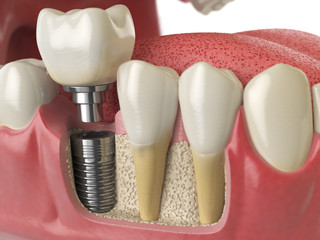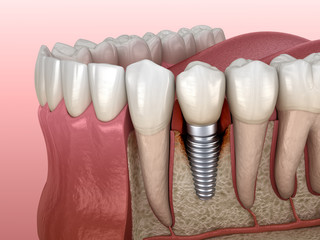Periodontal disease and dental implants

Dental implants are usually titanium posts that are placed directly into the jaw bone to replace missing teeth.
There are usually three parts to an implant:
- The titanium post in the bone
- A metal abutment (joint between the implant and crown)
- Crown (the white tooth that you see in the mouth).
They have been used with great success in dentistry for several decades now but are by no mean guaranteed to succeed, and they are not suitable for everyone.
Each practice I work at have very experienced dentists who place implants. Although I do not place implants personally, we work closely together to try to improve the chances of success of your treatment.
Periodontal disease can affect implants much quicker than our natural teeth, hence dental implants require regular professional examination and life long maintenance
Periodontal disease and implants (aka peri-implant disease)
Peri-implant diseases are inflammatory conditions affecting the soft and hard tissues (gum and bone) around dental implants. Similar to a natural tooth, bacteria can build up on the implant, below the gum line.
Over time, the bacteria irritate the gum tissue, causing it to become inflamed, damaging the tissue and if not caught early cause the bone structure around the implant to deteriorate.

The gum around implants SHOULD NOT BLEED!
The gum around implants should be pink and firm
It is IMPERITIVE that you clean adequately around the implant
Home cleaning around implants can be different to natural teeth and we will show you which techniques and brushes work best
Peri-implant disease - Causes
Is important to recognize that the exact cause of implant failure is not well understood, however there is some evidence on the most likely contributing factors
History of periodontitis
Poor oral hygiene – this could relate to improper technique or inadequate access to the site

Smoking or vaping
Prosthetic factors (the type, size and shape of your implant crown)